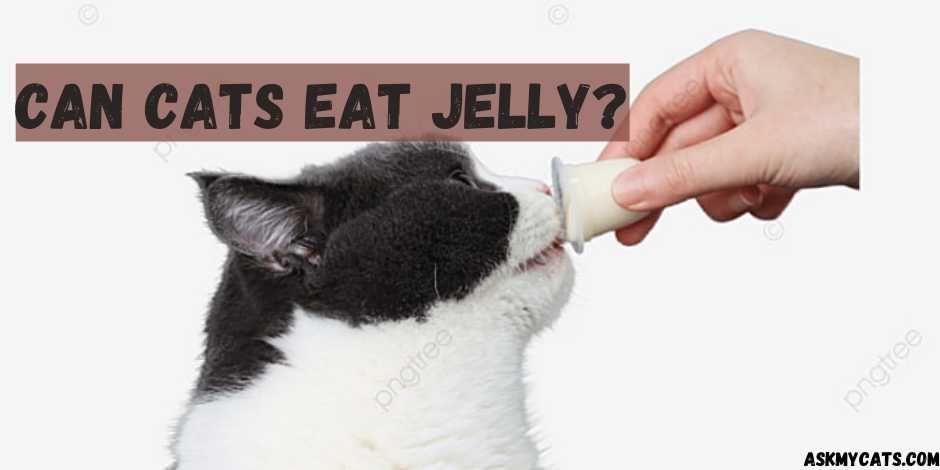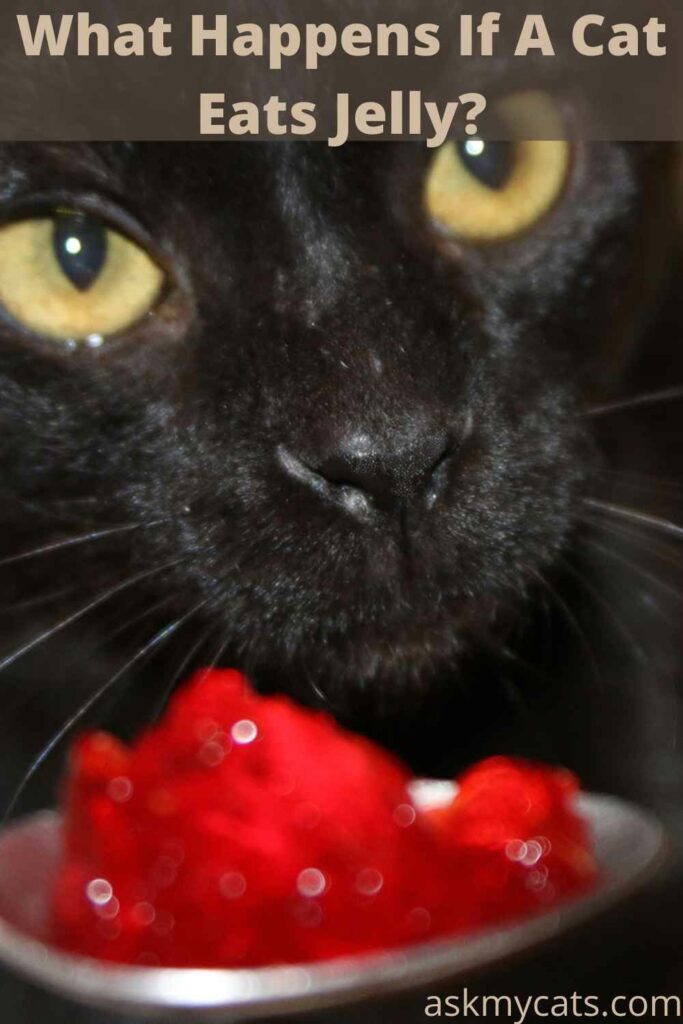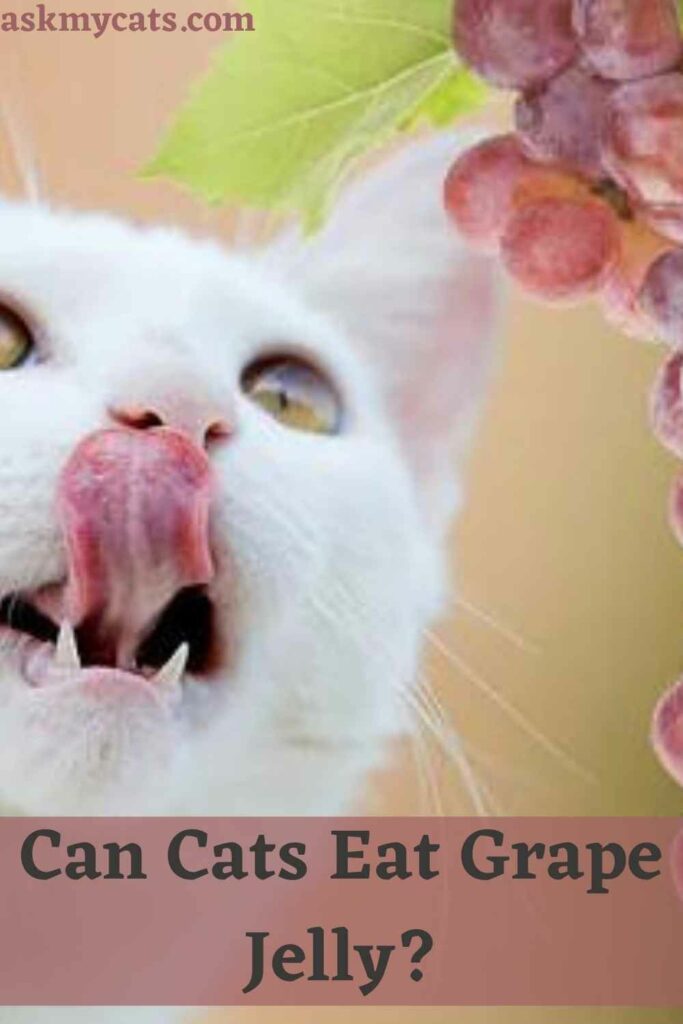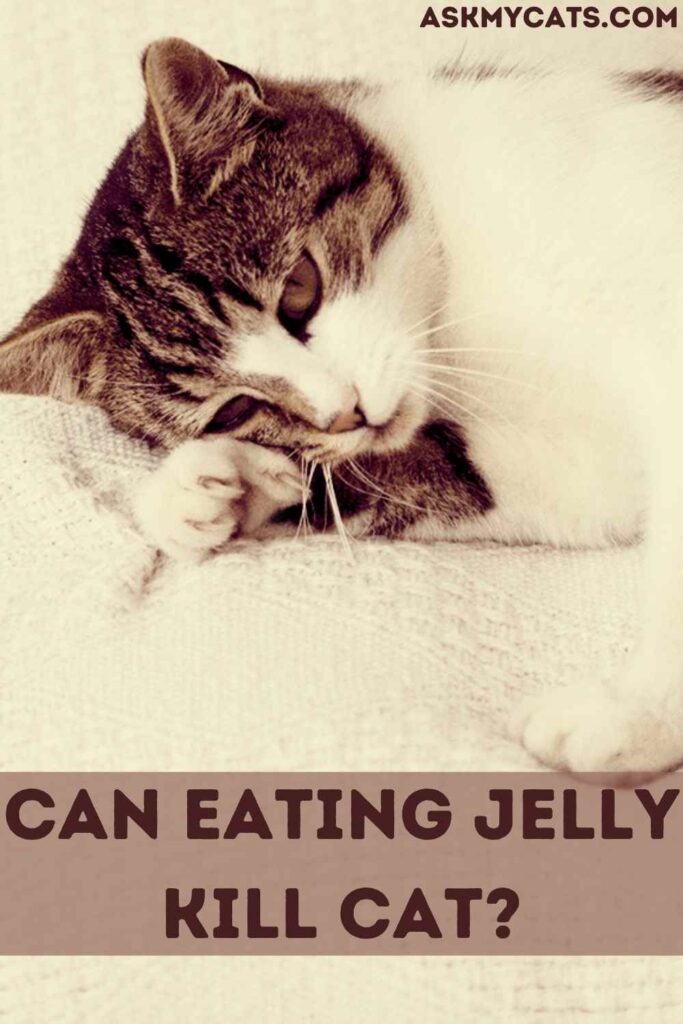Jelly is a fruit-flavored confection that is created by heating and then cooling a liquid containing gelatin or a similar setting agent in a mold or dish until it sets into a semi-solid, slightly elastic mass. It is popular among both children and adults. However, can cats eat jelly?
This is hard to answer in a straight yes or no form, as the answer entirely rests on the type of jelly the cat is fed. However, there is still something to remember when providing jelly, regardless of the type. Because sugar is the main component of jelly, it should only be consumed in moderation.
Keep reading the article to know about the type of jelly you can feed your cat and the type that you must avoid.


Give Your Cat the Perfect Day
Get the Free Ebook!
What Happens If A Cat Eats Jelly?
Jelly is not toxic for cats if given in moderation. However, if not it can make your cat sick.

The good news is that cats are not poisoned by jelly. If your cat has eaten a small amount, he should be fine, though he may have digestive problems.
Cats that have eaten too much jelly, on the other hand, may become ill.
The sugar in jelly beans is to blame for this. Sugar can cause digestive problems, including pancreatitis.
Pancreatitis is a painful medical illness in which the pancreas is inflamed.
Furthermore, if cats eat too much jelly on a regular basis, they are more likely to grow obese and suffer diabetes, liver disease, or gall bladder disease.
If your cat has eaten jelly beans, you may observe the following symptoms:
- Diarrhea
- Vomiting
- Nausea
Eating 1-2 jelly beans might induce these symptoms, especially in cats with sensitive stomachs. The issue here is that the vomiting and diarrhea could be ongoing, resulting in dehydration.
Make an appointment with your veterinarian if your cat gets nonstop diarrhea and vomiting. These symptoms can be treated with medication, as well as IV fluids to rehydrate your cat.
You may notice the following symptoms if your cat has pancreatitis:
- Lethargy
- Dehydration
- Increased urination/thirst
- Appetite lessness
- Loss of weight
- Pain in the abdomen
- Vomiting
- Diarrhea
If your pet exhibits these signs, it’s time to visit the veterinarian. This is a life-threatening situation.
Jelly, as you can see, is not harmful to cats; nevertheless, too much jelly can make a cat very unwell.
So, if your cat eats jelly in moderation, he’ll probably be fine. However, in the future, make sure the jelly beans are out of reach of your cat.
Also, check out can cats eat gummy bears
Do Cats Like Jelly?
Cats don’t like jelly in particular as they are carnivores and jelly does not entice them.
After all, cats are designed to eat meat, not fruity, sweet gels, so there’s not much in jelly that would entice them. So, if your cat is chasing it, it’s most likely because he’s curious.
Having said that, there are always cats who defy cat behavior and enjoy eating jelly when they get the chance. Cats will try to chew on it just because they see you doing it and want to join in.
Do Cats Hate Jelly?
No, cats do not hate jelly, they might try to lick it but then become indifferent towards it.
Cats are unlikely to despise jelly any more than they would adore it. They might give it a lick out of curiosity, then walk away and forget about it.
If this is the case, you don’t have to feel bad about depriving your pet of anything because jelly isn’t beneficial for them and they gain no nutritional benefit from eating it.
If your cat refuses to eat your jelly, consider yourself lucky that you have one less thing to chase it away from.
Also, check out can cats eat candy
Can Cats Eat Strawberry Jelly?
Yes, cats can eat strawberry jam but only if given in moderation.
Strawberries are high in sugar, which is bad for diabetic cats.
According to a 2005 study published in Scientific American, cats lack the taste receptors for sweetness. As a result, they are less interested in sweet fruits.
When two proteins (Tas12r and Tas13r) are mixed, they produce flavor. Because cats lack the protein Tas12r, they are unable to detect sweetness in food.
If you’re eating strawberry jam, your cat might be inquisitive about what you’re eating and try some. You can feed jam to cats in moderation.
Make sure the jam doesn’t include any sweeteners like xylitol before offering it to your cat. This is harmful to a cat’s health.
Use sugar-free organic jam. Stop giving the cat strawberry flavoring. If your cat eats it by accident and its digestive system is upset, contact your veterinarian right once.
And, if your cat is gaining too much weight, instead of feeding her other meals, you should feed her a weight-control meal for her health.
Can Cats Eat Grape Jelly?
No, a cat must not eat grape jelly as grapes are toxic to cats.

The only type of jelly that cats should avoid is grape jelly.
Grape jelly, like grapes, can be poisonous to cats. The main reason for this is that it is made primarily of grapes.
Feeding grape jelly to your cat is not recommended.
Despite the fact that the hazards of grape jelly are far more established in our canine companions, there have been cases of cats becoming severely sick after eating grapes.
Scientists are still attempting to figure out which chemical in this fruit causes harm to our feline companions, but since we don’t know how the toxicity works, it’s safest to presume that grapes and grape jelly are toxic to cats and exclude them from your cat’s diet.
The following are some indicators that your cat may be suffering from grape toxicity:
- Vomiting
- Diarrhea
- Pain in the abdomen
- Appetite decreases
- Excessive thirst
If you observe any of these symptoms, contact your veterinarian immediately. These symptoms could suggest kidney failure, which is why it’s critical to act promptly.
Because this is such a serious illness, it’s critical to get medical care as soon as the first signs of poisoning appear.
Can Cats Eat Sugar-Free Jelly?
No, feeding your cat sugar-free jelly should be avoided as to replace the sugar they often come with other additives which can be more harmful to the cat.
Many assume that since cats should avoid sugar, sugar-free food should be good for them.
Unfortunately, just because it’s sugar-free doesn’t imply it’s “healthy” for your cat. In most cases, sugar-free jelly contains substances that are far more toxic to your cats.
Sugar-free can sometimes be worse because cats’ bodies don’t know how to absorb these substances. It’s the same with humans, as they say.
So, give sugar jelly to your cat if he or she wants a lick or two.
Can Cats Have Jelly Sweets?
Giving your cat jelly sweets should be avoided as it has a large amount of sugar present in it in addition to Xylitol, which is toxic to cats.
Jelly candies like jelly beans, jelly toffee, and gummy bears, for example, can induce gastrointestinal problems in animals. Products containing Xylitol, an artificial sweetener, are the most dangerous.
A cat can experience a severe drop in blood sugar, begin vomiting, become lethargic, and have trouble standing or walking about 30 minutes after taking a tiny amount of a Xylitol-sweetened product.
Some felines may get seizures, internal hemorrhaging and lesions, and liver failure.
If you notice any of these signs, call your veterinarian right once. These signs and symptoms could indicate renal failure, so it’s vital to act quickly.
Because this is such a deadly sickness, seeking medical attention as soon as the first signs of poisoning arise is crucial.
How Much Jelly Is Safe For Cats?
A lick or two of jelly should be a safe amount for your cat to consume.
While the jelly isn’t good for your cat, it’s also not bad for it. A lick or two of jelly is unlikely to harm your cat, but if you’re concerned, keep an eye on it for a day or two afterward to ensure your cat doesn’t have a negative reaction.
However, you should not give it to your cat very often, and it should never be used as a substitute for a full meal.
Jelly is bad for cats, and they would quickly get starved if they tried to survive on it. And, in any case, it won’t be very fun for your cat because they can’t taste it!
Can Eating Jelly Kill Cat?
It is highly unlikely that eating jelly will kill your cat but there are some rare cases where the ill effects are long-lasting.

You don’t have to be concerned about jelly killing your cat because it’s extremely unlikely.
There are, however, outliers that can make life more difficult for a cat, as well as long-term health issues to consider.
To begin with, cats should never be given grape jelly. Antioxidants in grapes are harmful to cats, and even a small amount can make them sick or even kill them.
Now, because the amount of grape in most jellies is so small, you probably don’t need to rush to the vet right away if your cat stole a lick (though you should keep an eye on your cat for the next two days to make sure it didn’t become sick), but the grape is arguably the most harmful of all the jellies.
Second, jelly is high in sugar, which cats are unable to process effectively.
Obesity and diabetes are readily caused by a diet high in carbohydrates and sweets, both of which will likely kill your cat in the long run – or at the very least substantially reduce its lifespan.
A high-sugar diet is also harmful to a cat’s teeth and gums, increasing the risk of cavities and tooth decay, which can cause a lot of pain later in life.
Jelly also has nothing nutritionally beneficial for cats to consume — fruit, like sugar, is useless to cats, so you’re essentially giving your cat junk food.
Last but not least, like with any new food, keep a check on your cat for adverse reactions.
Allergic responses in cats are frequently shown as:
- Scratching excessively
- Diarrhea or vomiting
- Abdominal discomfort
- Lethargy
- Wheezing
More serious symptoms include difficulty breathing, heart palpitations, and seizures, though your cat is unlikely to have a jelly allergy so severe.
Of course, if you know your cat is allergic to strawberries, don’t offer it the jelly that goes with it!
Can Cats Eat Jelly Beans?
No, feeding your cats jelly beans should be avoided as it has high amounts of sugar and some contain Xylitol.
Even if you admire your cat, feeding them jelly beans will not benefit them since jelly beans contain sugar, which is terrible for cats and causes gastrointestinal problems.
To make matters worse, certain jelly bean varieties contain xylitol, an artificial sweetener that is extremely toxic to cats.
They are poisonous to xylitol, which causes a sharp drop in their blood sugar, vomiting, and in some cases, seizures.
Internal hemorrhaging can occur in your lovely feline, and some cats can develop liver failure.
Feeding jelly beans to your cat is a terrible idea that will harm your cat.
Because feline stomachs are so different from human stomachs, the things we enjoy aren’t always good for cats.
Another crucial factor to consider is the size of your cat in comparison to your own.
One might believe that a single small jelly bean won’t make a difference.
However, because your cat’s stomach is so little in comparison, it will make a significant difference, and you don’t want to see your cat become ill and distressed within an hour.
Frequently Asked Question
Can cats eat apricot jam?
Ans. Yes, cats can eat apricot jam, but it must be given in moderation as overfeeding can cause diarrhea, vomiting, and lethargy in your cat.
Can kittens eat strawberry jam?
Ans. Yes, technically kittens can eat strawberry jam but it is not recommended for that as kittens should be given only those foods which can give them more energy and help them grow properly and develop into healthy cats.
What human food can cats eat?
Ans, Human foods can cat eat are Fish, meat, poultry, beef, and other meat is a natural option for your little feline friend.
Final Words
In general, most cats can eat jelly with no problems. It’s just vital that it’s done in moderation.
Because grapes can be poisonous to cats, you should strive to keep your cats away from grape jelly.
If your cat does consume jelly, keep an eye on them over the next 24 hours or so and contact your veterinarian right away if they exhibit any indications of illness.
For any other questions, keep it right here at askmycats.com
